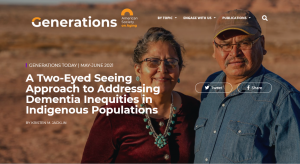A feature article in the American Society on Aging’s May-June 2021 publication, Generations, talks about taking a different approach to viewing dementia and Alzheimer’s that incorporates indigenous perspective. Author, Dr. Kristen Jacklin with the Memory Keepers Medical Discovery Team at the University of Minnesota Medical School, is funded by the National Institute of Health for a program of research on dementia in indigenous populations in Minnesota, Wisconsin, and Ontario.
A Two-Eyed Seeing Approach to Addressing Dementia Inequities in Indigenous Populations
Article Excerpt
Clinical approaches and health education programs and materials developed for non-Indigenous populations have been found to be inappropriate and ineffective. To ensure Indigenous knowledge is prioritized in our analysis we draw on a ‘two-eyed seeing’ framework.

Mi’kmaw Elder Albert Marshall explained that two-eyed seeing is a gift where we learn to see from one eye with the strengths of Indigenous knowledge and ways of knowing, and from the other eye with the strengths of Western knowledge and ways of knowing. An explicit two-eyed seeing approach addresses the power imbalance between the two knowledge systems, and places Indigenous knowledge on equal ground with Western knowledge.
….
Such differences between Western biomedical culture and Indigenous culture—essentially differences in core value systems—can result in fundamental incongruences in dementia knowledge. Our two-eyed seeing approach resulted in the translation of these findings into culturally specific dementia educational materials and clinical tools for Indigenous populations in Canada.
